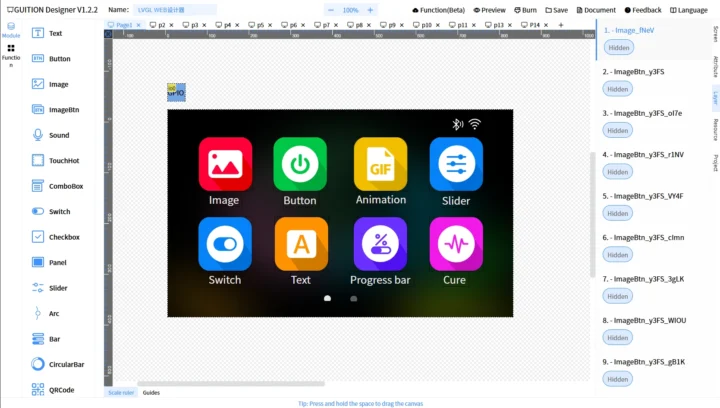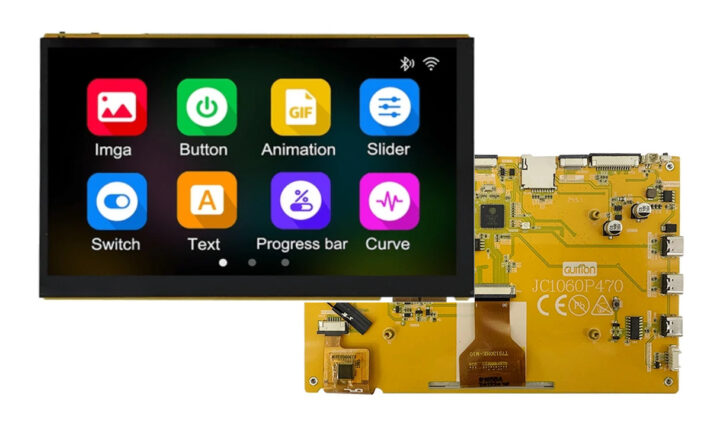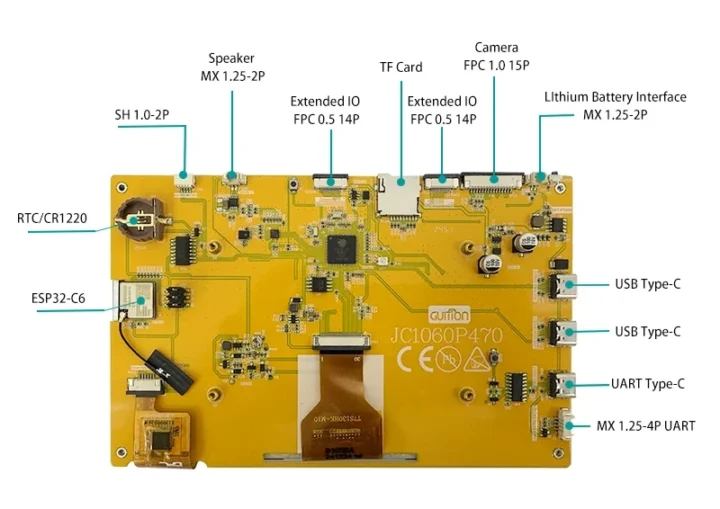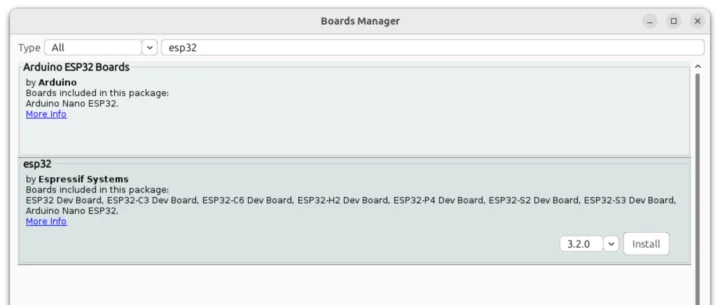GUITION JC1060P470C is an ESP32-P4 board with an integrated 7-inch touchscreen display and an ESP32-C6 WiFi 6 and Bluetooth 5 module providing wireless connectivity. The display also features a microSD card for storage, a MIPI CSI connector to add a camera, a few USB-C ports, and two FPC connectors for GPIO expansion.
It’s a more integrated version of the ESP32-P4-Function-EV-Board that can be used for HMI applications and that is compatible with the GUITION Designer online design tool to create LVGL-based graphical user interfaces.
GUITION JC1060P470C specifications:
- Microcontroller – Espressif Systems ESP32-P4
- CPU
- Dual-core RISC-V HP (High-performance) CPU @ up to 400 MHz with AI instructions extension and single-precision FPU, 768KB of on-chip SRAM
- Single-RISC-V LP (Low-power) MCU core @ up to 40 MHz with 8KB of zero-wait TCM RAM
- Memory – 768 KB HP L2MEM, 32 KB LP SRAM, 8 KB TCM
- ROM – 128 KB HP ROM, 16 KB LP ROM
- GPU – 2D Pixel Processing Accelerator (PPA)
- VPU – H.264 and JPEG codecs support
- CPU
- Storage
- 16 MB SPI flash
- MicroSD card slot
- Display I/F – 7-inch capacitive touchscreen IPS display with 1024 x 600 resolution, 16.7M colors; Note: based on the specifications, there’s another JC1060P470N model without touchscreen function
- Camera I/F – 15-pin MIPI CSI FPC connector
- Audio – 2-pin Speaker connector
- Wireless – ESP32-C6-MINI-1U module for WiFi 6 and Bluetooth 5 connectivity with external antenna
- USB – 3x USB Type-C ports, including one for debugging
- Debugging
- USB-UART Type-C connector
- 4-pin 1.25-inch UART connector
- Expansion – 2x 14-pin I/O expansion FPC connectors
- Misc – RTC with CR1220 battery holder
- Power Supply
- 5V via USB-C port
- 2-pin Lithium battery connector
- Power Consumption – About 600mA
- Dimensions – 164.9 x 104mm
- Weight – 260 grams
- Temperature Range – Operating: -20 to +70°C; storage: -30 to +80°C
The company points to display (JD9165) and touchscreen drivers (GT911) on the ESP IoT Solution GitHub repository, and also shares a zip file with user manual, PDF schematics, datasheets, and code samples for both the ESP-IDF framework and the Arduino IDE.
Support for the ESP-IDF was expected, but I’m more surprised about Arduino, since ESP32-P4 support in Arduino ESP32 is still a work in progress, with features such as MIPI DSI and CSI yet to be supported. There are more examples Demo_IDF, but the Arduino sketch is called “esp32p4_arduino_mipi-dsi_lvgl.ino”, indicating the display is working and the LVGL library is used for the user interface. It turns out there’s a separate “esp32” boards package provided by Espressif Systems for the ESP32-P4 Dev Board and a few other boards, and that’s what is being used here.
I had never heard about GUITION, but GUITION Designer is a web-based LVGL GUI interface developed in China that provides an alternative to the popular SquareLine Studio for Windows, Linux, and macOS. The documentation is only in Chinese, but as I understand it, GUITION Designer is free, and the company makes money selling displays instead of software licenses.

The 7-inch GUITION JC1060P470C ESP32-P4 touchscreen display is sold on AliExpress for $37, and I can also see a 10-inch ESP32-P4 display (JC8012P4A1C) going for $43.75.

Jean-Luc started CNX Software in 2010 as a part-time endeavor, before quitting his job as a software engineering manager, and starting to write daily news, and reviews full time later in 2011.
Support CNX Software! Donate via cryptocurrencies, become a Patron on Patreon, or purchase goods on Amazon or Aliexpress







